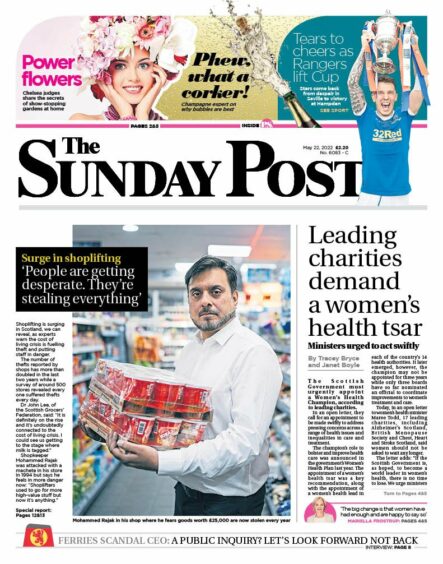
The doctor’s surgery, hospital wards and research labs are not obvious locations for persistent sexism but, according to Marieke Bigg, too many women are enduring too many health inequalities.
From research to treatment, diagnosis to medication, the sociologist and author fears pervasive “societal power imbalances” have far-reaching life-changing repercussions for women and their health.
“These power imbalances determine who is heard, what bodies matter, and which people’s needs are prioritised,” explained Bigg. “It means the options in terms of the service and care delivered, but also the medicine itself and the treatment available, cater primarily to men, not women.”
For too long, argues Bigg in her new book, This Won’t Hurt, women have been ignored, misunderstood and misdiagnosed because of the idea that “everything beyond the reproductive organs is the same across genders”.
The male anatomy has long been used as the default across biological research, despite the fact that the female body simply works differently to the male. Bigg continued: “Assumptions about gender that stem from these power imbalances have shaped the field of knowledge around research questions that matter to the people in power.
“This has meant, historically, men funding research, male researchers doing the research, and then also primarily for a long time – although this is slowly changing – mainly male medical professionals delivering the care in a way that makes sense to them and their bodies.
“All that doesn’t take into account or respond to the needs of women’s bodies, or the lived experience of women and how these problems function in their lives, but also what makes care accessible to them.
“It means that we’re building this area of knowledge that is going to continue to serve men, and will further disadvantaged people who are not men by failing to attend to their health problems – exacerbating those health problems.
“That then affects their ability to work and to care and to live, so it also ends up disenfranchising them in their lives, both within medicine and in society.”
Although more women are entering medicine, research areas such as gynaecology and obstetrics still continue to be considered less desirable than other fields that attract more grants and publicity.
Less than 2.1% of publicly funded research is dedicated solely to women, despite the fact 31% of women experience severe reproductive health symptoms, and Biggs believes this has consequences.
“There are underlying ideas about women that exist in society – women are lesser, second-class citizens still, really, and this idea maps on to science as well,” she explained. “It’s created this idea that cutting edge, technologically advanced, more interesting science are fields that are relevant to men, and not specifically to women.
“For example, reproduction has been sidelined for a long time as a not very scientifically advanced or interesting research field – not much funding goes into it and scientists don’t want to work in it as it’s not considered to be a field in which you build an illustrious career.”
As well as continuing to skew the focus of emerging research, the everyday implications of male-centred medicine means women are more likely to be misdiagnosed
Heart disease is still often considered a male disease, and the classic signs and symptoms of a heart attack – clutching at the chest in pain – are often specific to men. More common manifestations in women are, instead, fatigue, nausea, jaw, back or arm pain or shortness of breath, and as a result of our poor understanding, women who have a heart attack are 59% more likely than men to receive the wrong diagnosis.
“In fields like cardiology, the gender-specific questions that matter to women haven’t really been asked,” explained Bigg. “Women have gender-specific pain pathways, which means that same medication isn’t going to work on them. There’s also been research showing that certain migraine treatments won’t work on them in the same way or the dosing of morphine needs to be different.
“That has palpable, quite scary consequences in terms of medical treatment, particularly the fact that we’re not investigating these sides of female biology or heart disease presenting differently. Heart disease is often presented to us as a male problem when it is the No. 1 cause of death for women, and kills six times more women than breast cancer. Yet somehow, still, we don’t see it as a woman’s problem because it hasn’t been adequately investigated.”
Through detailed analysis, research and expert insight, Bigg says her aim is to “bring to light” our lack of knowledge around women’s bodies and the factors behind it.
“It’s something that’s so insidious, and that’s so difficult to unpack and unpick, and it exists in so many interactions and assumptions we hold,” she said. “
She added: “I do want people to feel angry, I want to stress the importance of listening to women and their needs, shaping services to meet those needs, and prioritising them and research – but I also want to give hope.
“I really hope that we’ll have discussions that spark people’s imaginations and shows that if we take women’s health and put it at the centre of science, we’ll be doing science better, and it will open up these really interesting, really exciting, scientific possibilities. That will animate us, and anger only goes so far.”
This Won’t Hurt: How Medicine Fails Women by Marieke Bigg is out on Thursday.
Professor: Talk more and fund more to close inequalities
Tackling healthcare inequalities for women in Scotland will require more than just funding and research, according to one of the country’s leading experts.
Andrew Horne, professor of gynaecology and reproductive sciences at Edinburgh University, admits moves to curb the so-called gender healthcare gap, which manifests itself in misdiagnosis, poor access to services and ongoing stigma around reproductive health, are not happening quickly enough.
“Historically, health inequality has been a huge problem and it’s the result of a mixture of women’s health issues just not being talked about because of embarrassment, and a lot of the issues like pain and bleeding being normalised,” he explained. “The other problem has been funding.
“While, of course, things have changed quite a lot, in the past funding boards were mainly made up of men who perhaps hadn’t heard of some of the conditions that affect women, particularly common conditions like pelvic pain, endometriosis, and fibroids.
“There has been a shift to try and improve that but we’re still way behind the curve and it’s going to take a long time to catch up. Even though funding bodies are now starting to recognise women’s health issues much more than they did, it’s almost like too little too late for people suffering at the moment.”
The Scottish Government’s Women’s Health Plan, which was announced last year, does represent a step forward in terms of raising awareness and should lead to improvements as reports and recommendations are implemented. However, the impact of waiting times on diagnosis and treatment for conditions like endometriosis, a specific focus of Horne’s own research, will take longer to tackle.
The Post would reveal how one supposedly flagship measure – the appointment of a women’s health champion – might take three years and demanding more urgency, enlisted the support of 17 national health charities, which signed an open letter to the Scottish Government last May as we ran a series of reports detailing how women endured health inequalities across a wide range of conditions and research.
Last month, Professor Anna Glasier, an expert in reproductive health, was appointed as Scotland’s new Women’s Health Champion, and her aim will now be to prioritise menopause services, menstrual health, endometriosis, polycystic ovarian syndrome and heart health as part of the NHS’ overall Women’s Health Plan.
For Professor Horne it’s a positive move, but only the beginning of addressing wide-ranging issues within the health service.
He said: “I do think things are getting better, but we’ve still got a long, long way to go. The Scottish Government is really trying to tackle these issues, ensuring more research funding is going to women’s health issues like endometriosis, and they are also trying to tackle the huge waiting list we’ve been left with after Covid. So, things are happening but it’s going to take time.
“Professor Glasier is a fantastic example of someone who has, during her own career, championed women’s health issues, particularly around contraception and abortion, and I think she’s a great appointment to the position. She’s not afraid to speak out and take action to try.”

Enjoy the convenience of having The Sunday Post delivered as a digital ePaper straight to your smartphone, tablet or computer.
Subscribe for only £5.49 a month and enjoy all the benefits of the printed paper as a digital replica.
Subscribe © Paul Stuart
© Paul Stuart